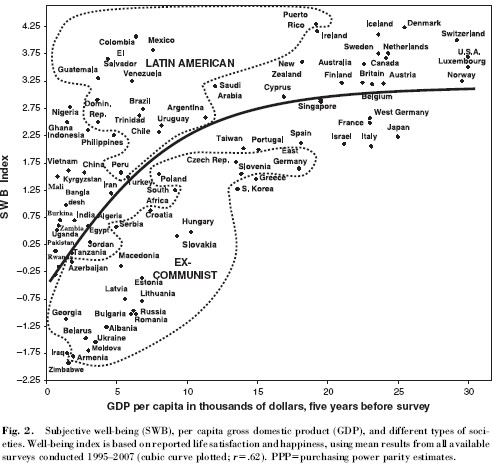Put differently, the key to happiness is freedom, feeling safe and not income.
Monday, European governments pleaded a total of €1,873bn as part of co-ordinated plans to shore up their financial sectors, sparking sharp rallies across the continent’s stock market Monday and Tuesday this week.
This bail-out is boosting investor confidence while lifting stock markets. Unfortunately, nobody knows for certain if this will suffice to make sure that European consumers will spend their cash during the upcoming pre-Holiday Season. If German, French and UK consumers will keep their wallets closed, however, these economies will slow down abruptly.
During such uncertain times, it is interesting to look for research that addresses consumer happiness. If such research suggests that it takes more than just money to keep our consumers happy, we get interested.
subjective well-being, inequality, discrimination, sense of free choice

Copyright 2008 Association for Psychological Science
The above graph indicates that happy countries include social democracies such as Sweden or Netherlands and more laisser faire economies such as Switzerland and the U.S. These countries do have a few things in common: democracy, rule of law and social tolerance. In turn, citizens are largely capable of engineering their own happiness when given the means to do so.
You can download the full paper with all the numbers AND graphics here:
Get a press release (44 pages – unfortunately, all tables and figures missing) and alternative download of the white paper here:
Development, freedom , and rising happiness: A global perspective (1981-2007) – press summary
Things to ponder
Looking at the above figure and reflecting on data presented in this research paper one does start to wonder a bit. For instance, what is interesting is that the countries ahead of the pack show some great differences as far as equality is concerned. Denmark and Norway have lower inequality levels than Luxembourg, Switzerland or USA. Nevertheless, people are happy in all these countries it seems.
Or, how do we explain that countries such as Germany, Portugal and Spain feel they have less choice and are therefore less happy than people in Switzerland. Put differently, besides data indicating that respondents’ subjective well-being is lower for countries such as Germany and France, what factors could help in explaining why people in Sweden or Canada are happier?
The study did not investigate how inequality (e.g., 5% of the population paying 70% of taxes and owning 90% of wealth in the country) may affect the reported findings. Hence, I am wondering how it can be that countries with vastly different levels of inequality show similar levels of happiness (e.g., Norway and USA)? Care to guess? Please leave a comment below.
Pingback: WhitePapers